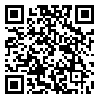Volume 9, Issue 4 (December 2022)
Health Spiritual Med Ethics 2022, 9(4): 207-216 |
Back to browse issues page
Download citation:
BibTeX | RIS | EndNote | Medlars | ProCite | Reference Manager | RefWorks
Send citation to:



BibTeX | RIS | EndNote | Medlars | ProCite | Reference Manager | RefWorks
Send citation to:
Abdoljabbari M, Dastani M, Jamshidi M A, Farhoush M, Farhoush M. The Effectiveness of Islamic Cognitive-behavioral Therapy Compared With Conventional Cognitive-Behavioral Therapy in Reducing Depression and Increasing Life Satisfaction and Spiritual Health in Patients With Depression. Health Spiritual Med Ethics 2022; 9 (4) :207-216
URL: http://jhsme.muq.ac.ir/article-1-518-en.html
URL: http://jhsme.muq.ac.ir/article-1-518-en.html
Morteza Abdoljabbari1 

 , Mahboubeh Dastani2
, Mahboubeh Dastani2 

 , Mohammad Ali Jamshidi3
, Mohammad Ali Jamshidi3 

 , Mojtaba Farhoush4
, Mojtaba Farhoush4 

 , Mohammad Farhoush *
, Mohammad Farhoush * 

 5
5


 , Mahboubeh Dastani2
, Mahboubeh Dastani2 

 , Mohammad Ali Jamshidi3
, Mohammad Ali Jamshidi3 

 , Mojtaba Farhoush4
, Mojtaba Farhoush4 

 , Mohammad Farhoush *
, Mohammad Farhoush * 

 5
5
1- Department of Islamic Education, Religion and Health Studies Center, Shahid Beheshti University of Medical Sciences, Tehran, Iran., Department of Education, School of Medicine, Shahid Beheshti University of Medical Sciences, Tehran, Iran.
2- Department of Psychology, Faculty of Industrial Engineering, Shahab-Danesh University, Qom, Iran., Shahab Danesh University, Qom, Iran
3- Department of Health Psychology, Faculty of Humanities, Edalat University, Tehran, Iran., Sadra Counseling Center, next to Mosli, Safia Square, Qom
4- Department of Quran and Psychology, Al-Mustafa International University, Qom, Iran., Al_Mustafa International University, Qom, Iran
5- Department of Islamic Education, Religion and Health Studies Center, Shahid Beheshti University of Medical Sciences, Tehran, Iran., Unit 27, Block 1, Aftab building, Alley 5, Shahid Ghodousi St., 75 m Ammar Yaser, Qom, Iran ,farhoush.mohammad@gmail.com
2- Department of Psychology, Faculty of Industrial Engineering, Shahab-Danesh University, Qom, Iran., Shahab Danesh University, Qom, Iran
3- Department of Health Psychology, Faculty of Humanities, Edalat University, Tehran, Iran., Sadra Counseling Center, next to Mosli, Safia Square, Qom
4- Department of Quran and Psychology, Al-Mustafa International University, Qom, Iran., Al_Mustafa International University, Qom, Iran
5- Department of Islamic Education, Religion and Health Studies Center, Shahid Beheshti University of Medical Sciences, Tehran, Iran., Unit 27, Block 1, Aftab building, Alley 5, Shahid Ghodousi St., 75 m Ammar Yaser, Qom, Iran ,
Abstract: (926 Views)
Background and Objectives: Some studies have shown that spirituality and religion are related to more life satisfaction and less depression. The present study examined the effectiveness of Islamic cognitive-behavioral therapy (CBT) compared to conventional CBT in reducing depression and increasing life satisfaction and spiritual health in patients with depression.
Methods: This is a random trial with a pre-test-post-test design. There were 30 participants in this study; 15 participants received conventional CBT and 15 received Islamic CBT. The instruments used for data collection included a semi-structured interview based on diagnostic and statistical manual of mental disorders, 5th edition (DSM-5), Glock and Stark’s (1970) Religiosity Scale, Beck’s depression inventory, Diner’s life satisfaction questionnaire (1985), and Paloutzian’s spiritual wellbeing scale, which were filled in before and after the treatment sessions. Each protocol included ten 50-minute sessions. The collected data were finally analyzed using multivariate analysis of covariance (MANCOVA).
Results: Islamic CBT led to a significantly higher level of spiritual health compared to conventional CBT (P<0.001). Both methods led to a significant reduction in depression and increased life satisfaction and no significant difference was found between them.
Conclusion: It is suggested that Islamic CBT should be improved in terms of psychological components and techniques combined with spirituality so that its effectiveness in reducing depression and increasing life satisfaction can be improved compared to conventional CBT.
Methods: This is a random trial with a pre-test-post-test design. There were 30 participants in this study; 15 participants received conventional CBT and 15 received Islamic CBT. The instruments used for data collection included a semi-structured interview based on diagnostic and statistical manual of mental disorders, 5th edition (DSM-5), Glock and Stark’s (1970) Religiosity Scale, Beck’s depression inventory, Diner’s life satisfaction questionnaire (1985), and Paloutzian’s spiritual wellbeing scale, which were filled in before and after the treatment sessions. Each protocol included ten 50-minute sessions. The collected data were finally analyzed using multivariate analysis of covariance (MANCOVA).
Results: Islamic CBT led to a significantly higher level of spiritual health compared to conventional CBT (P<0.001). Both methods led to a significant reduction in depression and increased life satisfaction and no significant difference was found between them.
Conclusion: It is suggested that Islamic CBT should be improved in terms of psychological components and techniques combined with spirituality so that its effectiveness in reducing depression and increasing life satisfaction can be improved compared to conventional CBT.
Type of Study: Original Article |
Subject:
General
Received: 2023/02/13 | Accepted: 2023/07/15 | Published: 2022/12/31
Received: 2023/02/13 | Accepted: 2023/07/15 | Published: 2022/12/31
Send email to the article author
| Rights and permissions | |
 |
This work is licensed under a Creative Commons Attribution-NonCommercial 4.0 International License. |







